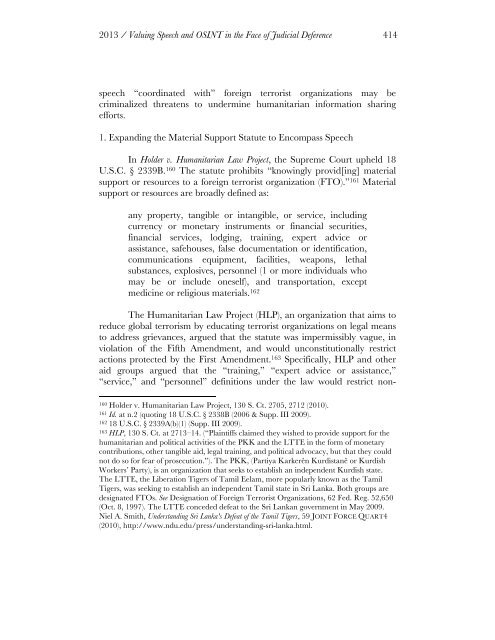Vo.4-Moshirnia-Final
Vo.4-Moshirnia-Final
Vo.4-Moshirnia-Final
Create successful ePaper yourself
Turn your PDF publications into a flip-book with our unique Google optimized e-Paper software.
2013 / Valuing Speech and OSINT in the Face of Judicial Deference 414<br />
speech “coordinated with” foreign terrorist organizations may be<br />
criminalized threatens to undermine humanitarian information sharing<br />
efforts.<br />
1. Expanding the Material Support Statute to Encompass Speech<br />
In Holder v. Humanitarian Law Project, the Supreme Court upheld 18<br />
U.S.C. § 2339B. 160 The statute prohibits “knowingly provid[ing] material<br />
support or resources to a foreign terrorist organization (FTO).” 161 Material<br />
support or resources are broadly defined as:<br />
any property, tangible or intangible, or service, including<br />
currency or monetary instruments or financial securities,<br />
financial services, lodging, training, expert advice or<br />
assistance, safehouses, false documentation or identification,<br />
communications equipment, facilities, weapons, lethal<br />
substances, explosives, personnel (1 or more individuals who<br />
may be or include oneself), and transportation, except<br />
medicine or religious materials. 162<br />
The Humanitarian Law Project (HLP), an organization that aims to<br />
reduce global terrorism by educating terrorist organizations on legal means<br />
to address grievances, argued that the statute was impermissibly vague, in<br />
violation of the Fifth Amendment, and would unconstitutionally restrict<br />
actions protected by the First Amendment. 163 Specifically, HLP and other<br />
aid groups argued that the “training,” “expert advice or assistance,”<br />
“service,” and “personnel” definitions under the law would restrict non-<br />
160 Holder v. Humanitarian Law Project, 130 S. Ct. 2705, 2712 (2010).<br />
161 Id. at n.2 (quoting 18 U.S.C. § 2338B (2006 & Supp. III 2009).<br />
162 18 U.S.C. § 2339A(b)(1) (Supp. III 2009).<br />
163 HLP, 130 S. Ct. at 2713–14. (“Plaintiffs claimed they wished to provide support for the<br />
humanitarian and political activities of the PKK and the LTTE in the form of monetary<br />
contributions, other tangible aid, legal training, and political advocacy, but that they could<br />
not do so for fear of prosecution.”). The PKK, (Partiya Karkerên Kurdistanê or Kurdish<br />
Workers’ Party), is an organization that seeks to establish an independent Kurdish state.<br />
The LTTE, the Liberation Tigers of Tamil Eelam, more popularly known as the Tamil<br />
Tigers, was seeking to establish an independent Tamil state in Sri Lanka. Both groups are<br />
designated FTOs. See Designation of Foreign Terrorist Organizations, 62 Fed. Reg. 52,650<br />
(Oct. 8, 1997). The LTTE conceded defeat to the Sri Lankan government in May 2009.<br />
Niel A. Smith, Understanding Sri Lanka's Defeat of the Tamil Tigers, 59 JOINT FORCE QUART4<br />
(2010), http://www.ndu.edu/press/understanding-sri-lanka.html.
















